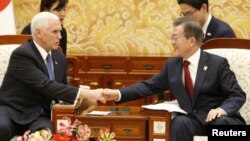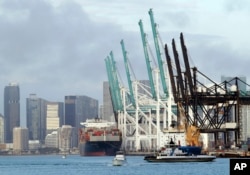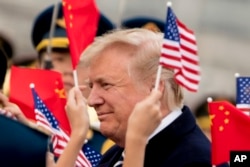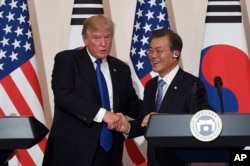A looming trade dispute could cause friction in the U.S-South Korea military alliance, but leaders in Washington and Seoul maintain their economic disagreements will not impact their continued security cooperation to deal with the North Korean nuclear threat.
Trade dispute
South Korean President Moon Jae-in promised on Monday to retaliate against U.S. protectionist trade polices, after the U.S. Commerce Department recommended to impose a sharp rise in steel import tariffs on 12 countries, including China, Brazil and South Korea, and also in response to a recent U.S. imposed tariff increase on South Korean washing machines of up to 50 percent.
"I ask the government to act firmly and sternly to unreasonable protectionist measures, such as lodging complaints to the World Trade Organization (WTO) and checking for violations of the U.S.-South Korea free-trade agreement," said Moon.
In a report issued on Friday, the U.S. Commerce Department cited the flood of cheaper steel and aluminum imports as a threat to U.S. national security by weakening an essential U.S. industry, and recommended that U.S. President Donald Trump take one of the following measures on steel imports:
* Impose a global tariff of 24 percent on all steel imports.
* Target 12 major steel exporting countries, including China and South Korea with new tariffs of 53 percent or higher.
* Set a quota on all steel imports, up to 63 percent of import 2017 levels.
The Commerce report also recommended similar restrictions on aluminum imports. Trump must respond to the Commerce Department recommendations by early April and can selectively decide which countries to target or exempt based on national security needs.
Job killing deal
Trump’s "America First" economic nationalism agenda advocates more fair and reciprocal trade between the United States and its allies. The president has also singled out the U.S.-South Korea free trade agreement, known as KORUS, as an American "job killing deal," that is responsible for doubling the U.S. trade deficit with South Korea from $13 billion to $27 billion since it took effect in 2012. Washington and Seoul are currently in the process of renegotiating terms of the bilateral trade deal.
Nearly 80 percent of the KORUS trade deficit is in the automobile industry, with Korean carmakers Hyundai and Kia prospering, while the U.S.-based General Motors recently announced plans to close a major automotive plant in South Korea due to declining sales. The GM plant closure has raised concerns that without government subsidies of some sort, the company might pull out of Korea entirely, putting over 16,000 employees, plus thousands of subcontractors, out of work.
The recent move by the United States to impose steep tariffs as high as 50 percent on South Korean washing machines and solar panels was also made to protect American manufacturers. Trump has said that South Korea, China and Japan have “gotten away with murder for 25 years” by taking unfair advantage of U.S. free trade policies and his administration would seek a reciprocal tax to compensate.
South Korea and China protested the tariffs as unfair protectionism and said it would seek a dispute settlement at the WTO. However it could be difficult to refute the claim of a national security exemption. The dispute process could also take years to resolve, and it is unclear if the Trump administration would follow a ruling from the WTO.
"The United States is a powerful country in the world, so even if Korea files a complaint with the World Trade Organization, gets it accepted and even if the WTO makes recommendations to the U.S., I am skeptical about how much of a powerful influence it would have," said Jae Yoon Lee, a researcher at the Korea Institute for Industrial Economics and Trade (KIET.)
As the seventh-largest export market for the United States, South Korea could also retaliate by targeting American agricultural products and financial sectors, two areas where U.S. imports have been growing. But taking such action would risk getting into a trade war with the United States, South Korea’s second largest trading partner after China.
Security cooperation
In addition to being important economic trading partners, the United States and South Korea are also longstanding military allies that have been closely coordinating to resolve the growing North Korean nuclear threat.
The South Korean newspaper Hankoreh in an editorial on Monday criticized the Trump administration’s punishing trade polices against its key ally in Asia and asked, "Can a country that behaves in such a way really be called an ally?"
Both the Moon and Trump administrations say they will not allow a bilateral trade dispute to undermine their security cooperation to defend against and ultimately halt North Korea’s growing nuclear and ballistic missile capabilities.
If North Korea again engages in threatening missile or nuclear tests, Washington and Seoul would likely prioritize security cooperation over economic division, said political analyst Bong Young-shik, with the Yonsei University's Institute for North Korean Studies in Seoul.
"There is a probability that South Korea and the United States are likely to set aside their trade dispute for the sake of dealing with the more urgent issues they face together," said Bong.
Seoul’s engagement efforts with Pyongyang has reduced tensions for now and led to the North’s participation in the Olympics. But South Korea also remains committed to support the U.S.-led sanctions to pressure the North to give up its nuclear program.
Lee Yoon-jee in Seoul contributed to this report.










